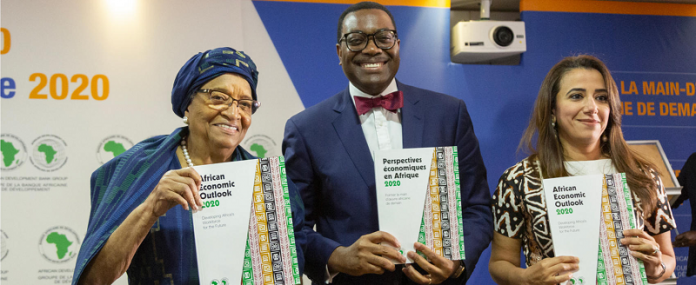Africa’s Economy to Grow Despite External Shocks: Economic Outlook 2020 - ENA English
Africa’s Economy to Grow Despite External Shocks: Economic Outlook 2020

Addis Ababa, January 31/2020(ENA) Africa’s economic growth that remained stable in 2019 at 3.4 percent and is on course to pick up to 3.9 and 4.1 percent in 2020 and 2021 respectively, the African Development Bank’s (AfDB) 2020 African Economic Outlook revealed on Thursday.
African Development Bank launched its 2020 edition of African Economic Outlook on Thursday under the theme “Developing Africa’s Workforce for the Future” Abidjan, Ivory Coast.
East Africa maintained its lead as the continent’s fastest-growing region, with average growth estimated at 5.0 percent in 2019; North Africa was the second fastest, at 4.1 percent, while West Africa’s growth rose to 3.7 percent in 2019, up from 3.4 percent the year before.
Central Africa grew at 3.2 percent in 2019, up from 2.7 percent in 2018, while Southern Africa’s growth slowed considerably over the same period, from 1.2 percent to 0.7 percent, dragged down by the devastating cyclones Idai and Kenneth.
The report calls for urgent investment in education and infrastructure for good returns in long-term GDP.
AfDB President, Akinwumi Adesina, underscored “youth unemployment must be given top priority. With 12 million graduates entering the labor market each year and only 3 million of them getting jobs, the mountain of youth unemployment is rising annually.”
He stressed on the need to look at the real lives beyond the statistics and feel the aspirations of the youth to hear their voices.
Africa needs to create 12 million jobs annually, to keep the current level of unemployment constant, it stated, and pointed out “with rapid technological change expected to disrupt labor markets further, it is urgent that countries address fundamental bottlenecks to creating human capital.”
Although many countries experienced strong growth indicators, relatively few posted significant declines in extreme poverty and inequality, which remain higher than in other regions of the world.
According to the report, inclusive growth-registering faster average consumption for the poor and lower inequality between different population segments-occurred in only 18 of 48 African countries with data.
AfDB Macroeconomic Policy, Forecasting and Research Department Director, Hanan Morsy, said Africa is blessed with resources but its future lies in its people…education are the great equalizer.
“Only by developing our workforce will we make a dent in poverty, close the income gap between rich and poor, and adopt new technologies to create jobs in knowledge-intensive sectors,” he emphasized.
According to the African Economic Outlook, Africa in 2019, for the first time in a decade, investment expenditure, rather than consumption, accounted for over 50 percent of GDP growth.
The shift can help sustain and potentially accelerate future growth in Africa, increase the continent’s current and future productive base, while improving productivity of the workforce.
Stating that there is education and skills mismatch where the quantity and quality of human capital is much lower than in other regions of the world, the Economic Outlook called for urgent swift action to address human capital development.
Developing a demand-driven productive workforce to meet industry needs and capacity building particularly investment on education and infrastructure with the highest return in long-term GDP are recommended by the report.
“Africa needs to build skills in information and communication technology and in science, technology, engineering, and mathematics. The Fourth Industrial Revolution will place increasing demands on educational systems that are producing graduates versed in these skills,” the report noted.